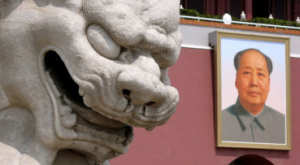 Many in my generation will confess to having read Lobsang Rampa in our teenage years- the heady mix of mysticism and the exoticism of Tibetan Buddhism… the feeling that these were new thoughts, and independent ones… the times, 1968, Paris, Danny the Red, and the draw of Kathmandu, all of it was irresistible. But it passed… temps perdu.
Many in my generation will confess to having read Lobsang Rampa in our teenage years- the heady mix of mysticism and the exoticism of Tibetan Buddhism… the feeling that these were new thoughts, and independent ones… the times, 1968, Paris, Danny the Red, and the draw of Kathmandu, all of it was irresistible. But it passed… temps perdu.
One thing that I recall being struck by in the Lobsang’s writings, such as they were, was the whole notion of the out-of-body experience. And on my recent trip to Beijing, I had this surreal feeling that I was going through it after all. Landing at the airport (also, like New Delhi’s called T3) and taking a ride into town, I had this feeling of being there and not quite, that déjà vu all over again. So much of the familiar layering the unfamiliar…
 Beijing is monumentally grand, Tiananmen Square most of all. With the gigantic portrait of Chairman Mao verily dominating the proceedings, the feeling of space and of consequence is huge. But more than that, most of the city has reinvented itself, and in much of it, one gets the feeling that there is a sense of purpose, of design. Perhaps it is the contrast, but one cannot but note that there is relatively little (or no) litter, no stray animals, good public transportation. I am told that the metro is a good example of order in chaos, but even that.
Beijing is monumentally grand, Tiananmen Square most of all. With the gigantic portrait of Chairman Mao verily dominating the proceedings, the feeling of space and of consequence is huge. But more than that, most of the city has reinvented itself, and in much of it, one gets the feeling that there is a sense of purpose, of design. Perhaps it is the contrast, but one cannot but note that there is relatively little (or no) litter, no stray animals, good public transportation. I am told that the metro is a good example of order in chaos, but even that.
I was there for the International Conference on Biological Physics, one at which I was one of two participants of Indian origin. (In contrast, at the hotel at which I was staying, there was a meeting of The World Peace Forum, at which I think I saw at least five Indians, “In Pursuit of Common Security: Peace, Mutual Trust, and Responsibility”!)
The area of biological physics has been growing steadily over the past decades, some of it deliberately so. As biologists began to recognise by the 1990’s many of the problems of modern biology needed help from others trained in slightly different areas. Mathematics, computer science, statistics, physics… The manner in which they then set out to attract people from other disciplines was exemplary. A lot of carrots, but the payoffs have been worth every bit of investment- the area of quantitative biology is one that has seen considerable expansion over the past decades.
At the UoH, we also recognised that when we set out our agenda for the Integrated M. Sc. in biology, which we named the IMSc (Systems Biology). Indeed, this is something that always gets admiration when I bring it to the notice of colleagues, that we had started this course quite some time ago.
 But, and there is a but, we have not taken ourselves as seriously as we should have. The Beijing conference had something like 400 local participants, of who 300 would have been students ranging from the third to the ninth year after high-school. Namely M. Sc. and Ph. D. students in our system. The seriousness with which they attended and participated in the meeting- or so it seemed to an outsider- was impressive. We, by and large, were not there. And should have been.
But, and there is a but, we have not taken ourselves as seriously as we should have. The Beijing conference had something like 400 local participants, of who 300 would have been students ranging from the third to the ninth year after high-school. Namely M. Sc. and Ph. D. students in our system. The seriousness with which they attended and participated in the meeting- or so it seemed to an outsider- was impressive. We, by and large, were not there. And should have been.
It is fashionable, in some circles, to make comparisons between the countries and to find ourselves wanting. It is actually difficult not to do that, but I feel that where we are wanting is in purpose more than anything else. Our obsession with the local and the everyday- important though they are- can make us lose sight of a higher purpose, if there is one. And not help us to see a higher purpose if one is not immediately apparent.
This is, regrettably, the script that gets played out at the local or at the national level day in and day out. Most of the problems we face nationally are major, whether it is on issues like water security, food security, public health, power, biotech… the real list is long, and to reach any kind of solution will need a lot of work from a lot of people. Our preoccupations, such as they are, keep us in the quicksand of the expedient, far from doing what we need to.
 To the title of this post. As Bogart says in Casablanca (of course to Bergman, and of course meaning something else) it doesn’t take much to see that the problems of three little people don’t amount to a hill of beans in this crazy world. Someday you’ll understand that.
To the title of this post. As Bogart says in Casablanca (of course to Bergman, and of course meaning something else) it doesn’t take much to see that the problems of three little people don’t amount to a hill of beans in this crazy world. Someday you’ll understand that.
We are more than three, but not really so many… and given the magnitude of the task we have to accomplish, I’d say it really it doesn’t take much to see that our little problems don’t amount to a hill of beans either. So lets get on with it, shall we?

